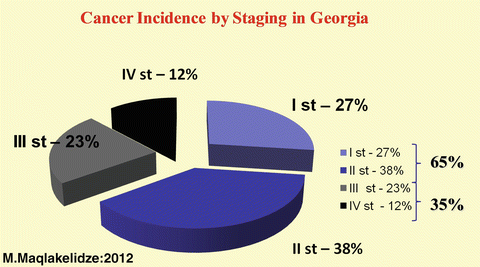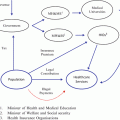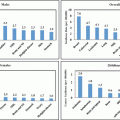Fig. 22.1
Cancer incidence by localization and sex in Georgia (2012)
Unfortunately, about half of newly revealed cancer cases are diagnosed at stage III–IV. The big number of the cases are resistant to treatment and rest require long term, costly treatment, medical, social, and psychological rehabilitation. Many cancer patients became disabled, abandon active lifestyle and often need a caregiver, what constitutes a heavy burden for their families and the public (Fig. 22.2).


Fig. 22.2
Cancer incidence by staging in Georgia (2012)
The destruction of registration process in recent years and the lack of statistical data on the distribution of real image distortion can be bases of missing clear date for cancer pathologies. To accomplish this, the incidence and mortality of malignant tumors in Georgia in recent years was significantly lower than in the CIS and European countries, which might not shows the real picture. According the date provided by NCDC, in 2012 the 94 new cases were registered in Georgia in malignant tumors per 100,000 inhabitants, including women—51.7 % [11–13].
In 2006, the Ministry of Labour, Health and Social Affairs in Tbilisi, first introduced in breast cancer and cervical screening programs using mammography and PAP (smear test). Since 2010, the 13-year-old girls in the country are carried out by the human papillomavirus (HPV) immunization program.
Since 2011, cancer screening programs in the country are as follows:
Oncology Service in Georgia
Creation of oncology service in Georgia outsets from the beginning of the twentieth century. The first oncology dispensary throughout the country was opened in 1946, and oncology research institute started functioning in 1958. Thus, oncology service used to function in Georgia during the soviet period constantly aiming to improvements. In 1960s, scientific, research, educational and most active practical activities were conducted at the scientific institute of oncology; collection of articles had been issued; workshops and conferences used to be arranged. Since 1959 under the decision of the government, a team with oncological profile had been created in Academy of Sciences of Georgia for the purpose of scientific activity organized management and proper support.
In 1990s political and social misery, changes and conflicts in the country dramatically hindered material–technical base updating of medical institutions, keeping of existing ones and caring over patients and medical personnel in Georgia. Due to utmost misery, it was impossible to distribute resources and to manage and monitor oncology services or care over oncology patients. However, during impeded activity and while caring for the first needs, oncology service tried to proceed with the work and to care over the patients.
Archive materials of that period show that during impeded activity of healthcare systems, initial diagnostics of oncology diseases were mainly done on the advances stages and exactly to that period is associated the opinion spread in the society interpreting oncology disease as the death verdict and incurable disease.
Unfortunately, abovementioned stigma appeared to be too strong and continuous struggle needed to be conducted. Such opinion still exists in certain part of the population till today; however, technological and medical achievements greatly altered this opinion.
Reimbursement of Cancer Service
Financial support of oncology and cancer diseases always existed in Georgia in very different ways. Co-financing had been performed with certain proportion. During the overhaul economic misery, oncological diseases, diagnostics, and treatment expenses had been reimbursed only for socially unguarded population and children (1990s/2000s years). Along with the private insurance sector development in the country oncological patients financing was initiated in Georgia by private insurance companies; however, this process was the reason for constant conflicts due to multiple limits existing in patients financing by the insurance companies. Since 2010s state share in co-financing had been increased and oncology service reimbursement became available for teachers and afterwards, for students [11, 13].
It should be noted that notwithstanding the state support and co-financing, there always had been certain limit and methods of diagnostics and treatment not subjected to financing. In case, if methods were not self-financed by the patient, effect of the care was reflected on the patient as the low quality of cancer care. For example, during a lot of years, in case of chemotherapy limit of reimbursement constituted GEL 600 (under the different currency rate it was US$250–300), it means that due to patients insufficient funds, it was impossible to conduct treatment in accordance with international standards and acknowledged clinical guidelines. It should be mentioned that, hormonotherapy did not financed and still is not financing currently (not by the state neither by the most of private insurance companies), palliative in patient service financing was also limited and it should be also noted, that none of the private insurance companies acknowledged necessity of palliative care and respectively didn’t finance cancer patients [11, 13].
State vision had been changed from 2013; state healthcare programs had been centrally implemented and the transition to state insurance system was conducted; cancer patients’ care (diagnostics, treatment, palliative care) became available for each citizen of Georgia; however, limits still exist and nowadays financing doesn’t apply to hystomorphology and endoscopy methods of diagnosis of patients, surgical and radiological treatment is still limited, targeted therapy is still not financed, inpatient palliative care is under the limitation of daily costs (inpatient limit for patient per day is 75 GEL, which means about US$40), and outpatient palliative care services are limited (only allowed for physician for visit reimburse; the reimbursement for physician cost for a visit is 11 GEL by the state program (about US$7 per visit); the maximum visits per month is eight and no other team members are paid, including the nurse) [11, 13].
NCCP of Georgia
The cancer professiona l community and policymakers spent a lot of time developing a comprehensive cancer control plan (NCCP). Between September and October 2010 there was an open public debate. Later, during November 2010 additional consultations on the Plan took place. In 2011, after permanent public debates and consultations, final version was adopted by Health Council. This enables to enact certain programs and activities already in 2011. With input from more than 20 professional, academic, and community-based organizations that worked together ten major goals were identified in the field of cancer control. The objectives of NCCP were promoting cancer data collection; rising public cancer awareness and healthy lifestyle popularization; enhancing healthy behaviors; increasing screening rate; improving access to the full spectrum of cancer diagnosis and care; implementing national diagnostic and treatment guidelines; increasing patient, caregiver, and healthcare professional awareness about issues of quality of life; increasing access to palliation and pain control; improving reporting quality of cancer incidence, mortality, and staging data; improving oncology service at each level.
NCCP sets out comprehensive strategy in fight against cancer. It’s the first time government adopted major program of action linking prevention, diagnosis, treatment, care, and research. As a result of reviewing the several governmental programs were implemented and have been funded so far, there is no the full, comlete implementation of NCCP and exact steps of development for it are exist yet.
Stay updated, free articles. Join our Telegram channel

Full access? Get Clinical Tree





